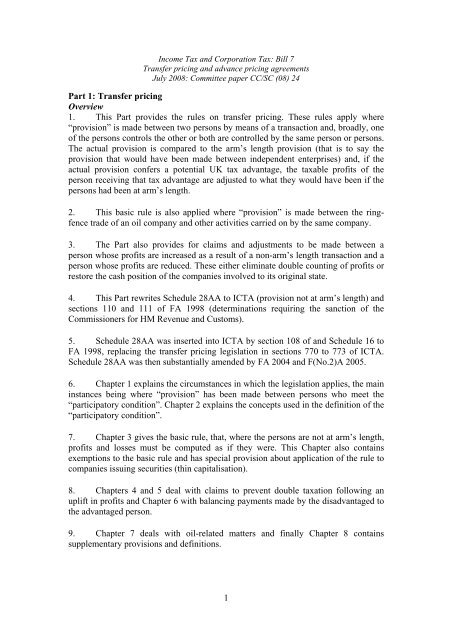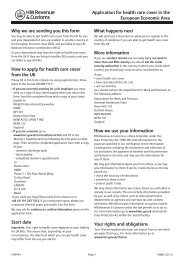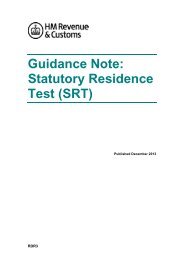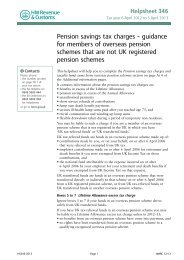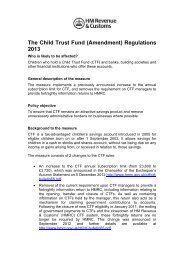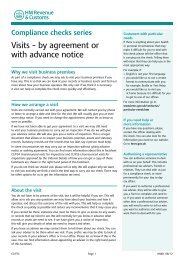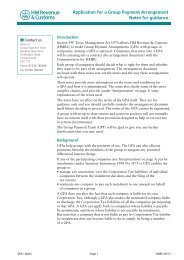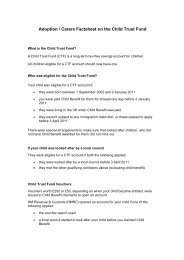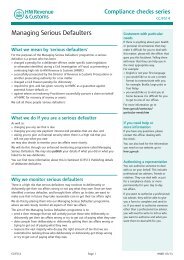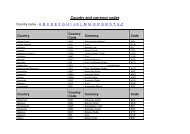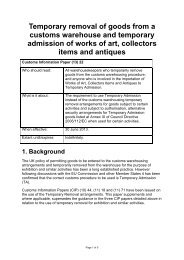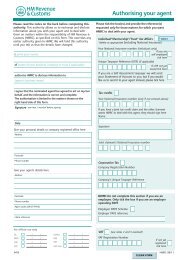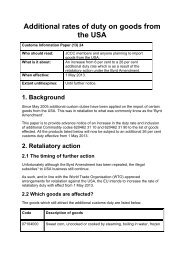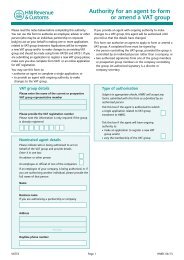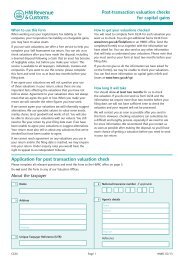Bill 7 - CC/SC(08) 24 - Transfer pricing - explanatory notes
Bill 7 - CC/SC(08) 24 - Transfer pricing - explanatory notes
Bill 7 - CC/SC(08) 24 - Transfer pricing - explanatory notes
Create successful ePaper yourself
Turn your PDF publications into a flip-book with our unique Google optimized e-Paper software.
Income Tax and Corporation Tax: <strong>Bill</strong> 7<br />
<strong>Transfer</strong> <strong>pricing</strong> and advance <strong>pricing</strong> agreements<br />
July 20<strong>08</strong>: Committee paper <strong>CC</strong>/<strong>SC</strong> (<strong>08</strong>) <strong>24</strong><br />
Part 1: <strong>Transfer</strong> <strong>pricing</strong><br />
Overview<br />
1. This Part provides the rules on transfer <strong>pricing</strong>. These rules apply where<br />
“provision” is made between two persons by means of a transaction and, broadly, one<br />
of the persons controls the other or both are controlled by the same person or persons.<br />
The actual provision is compared to the arm’s length provision (that is to say the<br />
provision that would have been made between independent enterprises) and, if the<br />
actual provision confers a potential UK tax advantage, the taxable profits of the<br />
person receiving that tax advantage are adjusted to what they would have been if the<br />
persons had been at arm’s length.<br />
2. This basic rule is also applied where “provision” is made between the ringfence<br />
trade of an oil company and other activities carried on by the same company.<br />
3. The Part also provides for claims and adjustments to be made between a<br />
person whose profits are increased as a result of a non-arm’s length transaction and a<br />
person whose profits are reduced. These either eliminate double counting of profits or<br />
restore the cash position of the companies involved to its original state.<br />
4. This Part rewrites Schedule 28AA to ICTA (provision not at arm’s length) and<br />
sections 110 and 111 of FA 1998 (determinations requiring the sanction of the<br />
Commissioners for HM Revenue and Customs).<br />
5. Schedule 28AA was inserted into ICTA by section 1<strong>08</strong> of and Schedule 16 to<br />
FA 1998, replacing the transfer <strong>pricing</strong> legislation in sections 770 to 773 of ICTA.<br />
Schedule 28AA was then substantially amended by FA 2004 and F(No.2)A 2005.<br />
6. Chapter 1 explains the circumstances in which the legislation applies, the main<br />
instances being where “provision” has been made between persons who meet the<br />
“participatory condition”. Chapter 2 explains the concepts used in the definition of the<br />
“participatory condition”.<br />
7. Chapter 3 gives the basic rule, that, where the persons are not at arm’s length,<br />
profits and losses must be computed as if they were. This Chapter also contains<br />
exemptions to the basic rule and has special provision about application of the rule to<br />
companies issuing securities (thin capitalisation).<br />
8. Chapters 4 and 5 deal with claims to prevent double taxation following an<br />
uplift in profits and Chapter 6 with balancing payments made by the disadvantaged to<br />
the advantaged person.<br />
9. Chapter 7 deals with oil-related matters and finally Chapter 8 contains<br />
supplementary provisions and definitions.<br />
1
Income Tax and Corporation Tax: <strong>Bill</strong> 7<br />
<strong>Transfer</strong> <strong>pricing</strong> and advance <strong>pricing</strong> agreements<br />
July 20<strong>08</strong>: Committee paper <strong>CC</strong>/<strong>SC</strong> (<strong>08</strong>) <strong>24</strong><br />
Chapter 1: Introduction to Part<br />
Overview<br />
10. This Chapter acts as a general introduction to the Part. It explains when the<br />
Part applies and gives some important definitions for this Chapter and the Part.<br />
Clause 1: Part applies where provision made or imposed<br />
11. This clause gives the two circumstances when the Part applies: first, where<br />
transactions take place between two persons who meet the participation condition and,<br />
second, where a person carries on an oil-related ring-fence trade and a transaction<br />
takes place between that ring-fence trade and another activity carried on by the same<br />
person.<br />
12. The clause is based on paragraphs 1(1) and (2), 9(1), 10, and 11(1) and (3). of<br />
Schedule 28AA to ICTA.<br />
13. In subsection (2) the words “oil-related” have been added to “ring-fence trade”<br />
in paragraph 11(1) and (3) of Schedule 28AA to make clear the area of taxation<br />
referred to. “Oil-related ring-fence trade” is defined in clause 60.<br />
Clause 2: Meaning of “affected persons” and “actual provision”<br />
14. This clause gives the meaning for this Part of two terms used in clause 1. It is<br />
based on paragraphs 11(3) and 14(1) of Schedule 28AA to ICTA.<br />
Clause 3: The “participation condition” referred to in section 1(1)(b)<br />
15. This clause explains when the participation provision is met in clause 1. It is<br />
based on paragraphs 1(1), 4A(6) and 4B(1) and (2) of Schedule 28AA to ICTA.<br />
Chapter 2: Participation in management, control or capital of a person<br />
Overview<br />
16. This Chapter explains what is meant by participation by a person in the<br />
management, control or capital of another person. The term is used in clause 3 which<br />
defines the “participation condition” for clause 1. The term is also used in subsequent<br />
provisions. Direct and indirect participation were dealt with together in paragraph 4 of<br />
Schedule 28AA to ICTA. In this Chapter they have been separated. Direct<br />
participation is explained in clause 4 and indirect participation in clauses 6 to 10.<br />
Clause 4: Direct participation<br />
17. This clause explains what is meant by direct participation in the management,<br />
control or capital of another. The clause is based on paragraph 4(1) of Schedule 28AA<br />
to ICTA.<br />
18. “Partnership” in paragraph 4(1) is rewritten in subsection (2) as “firm” in<br />
accordance with rewrite practice.<br />
2
Income Tax and Corporation Tax: <strong>Bill</strong> 7<br />
<strong>Transfer</strong> <strong>pricing</strong> and advance <strong>pricing</strong> agreements<br />
July 20<strong>08</strong>: Committee paper <strong>CC</strong>/<strong>SC</strong> (<strong>08</strong>) <strong>24</strong><br />
Clause 5: Meaning of “control” in cases involving sales of oil<br />
19. This clause applies a special meaning of “control” for applying the transfer<br />
<strong>pricing</strong> rules in relation to company oil sales. It is based on paragraph 9 of<br />
Schedule 28AA to ICTA. It qualifies the general definition of “control” given by<br />
clause 72.<br />
20. This clause causes the oil producer, seller and buyer to be connected persons<br />
for the purposes of the Part where the control threshold would not otherwise be met<br />
because the shareholding is insufficient. This allows the transfer <strong>pricing</strong> rules to apply<br />
where the oil-producing company is owned by a consortium.<br />
Clause 6: Indirect participation: defined by sections 7 to 10<br />
21. Clauses 7 and 10 set out four possible meanings of indirect participation in the<br />
management, control or capital of another person. For each reference to indirect<br />
participation, this clause lists the meanings which apply. It is based on<br />
paragraphs 4(2), 4A(1) and (2) and 6(4C) of Schedule 28AA to ICTA and<br />
section 85(6) of FA 1999.<br />
Clause 7: Indirect participation: potential direct participant<br />
22. This clause provides for a person to be indirectly participating in the<br />
management, control or capital of another if the person would be a direct participant<br />
in the other (see clause 4) were the person to have the rights and powers listed in<br />
subsection (3). It is based on paragraph 4(2) to (6) and (10) of Schedule 28AA to<br />
ICTA.<br />
23. Subsection (6), which rewrites paragraph 4(6) of Schedule 28AA, serves to<br />
clarify that all connected parties must be considered in applying the rule in<br />
subsection (3)(e), which rewrites paragraph 4(3)(d) of Schedule 28AA.<br />
Clause 8: Indirect participation: one of several major participants<br />
<strong>24</strong>. This clause provides that if two persons taken together control a body<br />
corporate or firm, and each of the two persons has at least 40% of their combined<br />
stake in the body or firm, then each of the two persons is indirectly participating in the<br />
body or firm. It is based on paragraph 4(2) and (7) to (10) of Schedule 28AA to ICTA<br />
and section 85(6) of FA 1999.<br />
25. “Enterprise” in subsections (2) and (3) is not defined. It is a term used in<br />
Article 9 of the OECD Model Taxation Convention and defined in Article 3 as “the<br />
carrying on of any business”. Article 3 goes on to say that “business” includes the<br />
performance of professional services and of other activities of an independent<br />
character. This meaning of enterprise applies here by virtue of clause 15 which<br />
requires this Part to be read consistently with Article 9.<br />
3
Income Tax and Corporation Tax: <strong>Bill</strong> 7<br />
<strong>Transfer</strong> <strong>pricing</strong> and advance <strong>pricing</strong> agreements<br />
July 20<strong>08</strong>: Committee paper <strong>CC</strong>/<strong>SC</strong> (<strong>08</strong>) <strong>24</strong><br />
Clause 9: Indirect participation: sections 3(2)(a) and (3)(a) and 29(2)(a):<br />
financing cases<br />
26. Under this clause an affected person acting with others to provide financing<br />
arrangements to the other affected person is treated as indirectly participating in that<br />
person’s management, control or capital. It is based on paragraphs 4A(1), (3) to (6)<br />
and 6(4C) of Schedule 28AA to ICTA.<br />
Clause 10: Indirect participation: sections 3(2)(b) and (3)(b) and 29(2)(b):<br />
financing cases<br />
27. This clause provides for someone other than an affected person acting with<br />
others to provide financing arrangements to the other affected persons to be treated as<br />
indirectly participating in their management, control or capital. It is based on<br />
paragraphs 4A(2), (3) to (6) and 6(4C) of Schedule 28AA to ICTA.<br />
Clause 11: Meaning of “connected” in sections 7<br />
28. This clause gives the meaning of “connected” for clause 7It is based on<br />
paragraph 4(11) and (12) of Schedule 28AA to ICTA.<br />
Chapter 3: Basic rule: Substitution of arm’s length provision<br />
Overview<br />
29. This Chapter gives the basic rule of the transfer <strong>pricing</strong> provisions: where a<br />
profit is less or a loss greater than it would have been if a transaction had taken place<br />
at arm’s length, they are to be computed as if the transaction had been at arm’s length.<br />
The Chapter also deals with various administrative issues (notices and appeals) and<br />
rules for applying the arm’s length concept to issues of securities (thin capitalisation).<br />
Clause 12: Basic transfer-<strong>pricing</strong> rule.<br />
30. The clause gives the basic rule. It is based on paragraphs 1(2) and 4A(7) of<br />
Schedule 28AA to ICTA.<br />
31. Paragraph 1(2) of Schedule 28AA makes the basic rule subject to paragraph 8<br />
of the Schedule. Subsection (6)(d) recognises that paragraph 8 is being rewritten in<br />
<strong>Bill</strong> 5, Parts 6 (loan relationships) and 8 (derivative contracts).<br />
Clause 13: Meaning of “arm’s length provision”<br />
32. This clause gives the meaning of “arm’s length provision” by reference to<br />
clause 12 and also provides that the basic rule applies where a transaction that has<br />
occurred would not in fact have occurred between independent enterprises. The clause<br />
is based on paragraphs 1(3) and 14(1) of Schedule 28AA to ICTA.<br />
Clause 14: Meaning of “potential advantage” in relation to United Kingdom<br />
taxation<br />
33. This clause explains what is meant by conferring a potential advantage in<br />
relation to United Kingdom taxation in this Part. It is based on paragraph 5(1) and (7)<br />
of Schedule 28AA to ICTA.<br />
4
Income Tax and Corporation Tax: <strong>Bill</strong> 7<br />
<strong>Transfer</strong> <strong>pricing</strong> and advance <strong>pricing</strong> agreements<br />
July 20<strong>08</strong>: Committee paper <strong>CC</strong>/<strong>SC</strong> (<strong>08</strong>) <strong>24</strong><br />
Clause 15: Interpreting Part in accordance with OECD principles<br />
34. This clause requires the Part to be read in a way that is consistent with the way<br />
in which Article 9 of the OECD model taxation treaty is read when included in a tax<br />
treaty entered into by the United kingdom. The clause is based on paragraphs 2<br />
and 14(1) of Schedule 28AA to, and section 828(1) and (3) of, ICTA.<br />
35. This requirement applies whether or not there is a tax treaty between the<br />
United Kingdom and any particular non-UK territory.<br />
36. This clause imports into the transfer <strong>pricing</strong> legislation not only the principles<br />
of Article 9 of the OECD model taxation treaty but also that organisations’ transfer<br />
<strong>pricing</strong> guidelines. The <strong>Transfer</strong> Pricing Guidelines for Multinational Enterprises and<br />
Tax Administration referred to in subsection (4)(a), were first issued in 1979 and<br />
extensively updated in 1995 with revisions and additions published periodically.<br />
37. No Treasury order has been issued under paragraph 2(3)(b) of Schedule 28AA<br />
to ICTA, which is the provision rewritten by subsection (4)(b).<br />
Clause 16: Exemption from basic rule: dormant companies<br />
38. This clause exempts dormant companies from the basic rule in clause 12. This<br />
clause is based on paragraph 5A of Schedule 28AA to ICTA and section 1297(5) of<br />
the Companies Act 2006.<br />
39. Paragraph 5A(4) of Schedule 28AA to ICTA adopted the definition of<br />
“dormant” given by the Companies Act 1985. Section 1297(5) of the Companies<br />
Act 2006 provided for that to be read as a reference to the corresponding definition<br />
given by the 2006 Act. Subsection (4) reflects this.<br />
Clause 17: Exemption from basic rule: small and medium-sized enterprises<br />
40. This clause exempts, with three exceptions, small and medium-sized<br />
enterprises (defined in clause 23) from the basic rule in clause 12. This clause is based<br />
on paragraph 5B(1) and (2) of Schedule 28AA to ICTA.<br />
Clause 18: Small and medium-sized enterprises: exceptions from exemption<br />
41. This clause gives two of the exceptions to clause 17: where there is an election<br />
that the exemption should not apply and where the other affected person is a resident<br />
of a non-qualifying territory. This clause is based on paragraph 5B of Schedule 28AA<br />
to ICTA.<br />
Clause 19: Medium-sized enterprises: exception from exemption: transfer<br />
<strong>pricing</strong> notice<br />
42. This clause gives the third exception to the exemption in clause 17. This is<br />
where the Commissioners for Her Majesty’s Revenue and Customs give a notice (a<br />
“transfer <strong>pricing</strong> notice”) to the potentially advantaged person that clause 12 is to<br />
apply. This clause is based on paragraph 5C(1) of Schedule 28AA to ICTA.<br />
5
Income Tax and Corporation Tax: <strong>Bill</strong> 7<br />
<strong>Transfer</strong> <strong>pricing</strong> and advance <strong>pricing</strong> agreements<br />
July 20<strong>08</strong>: Committee paper <strong>CC</strong>/<strong>SC</strong> (<strong>08</strong>) <strong>24</strong><br />
43. “In question” in paragraph 5C(1)(a) of Schedule 28AA was not rewritten on<br />
the ground that it was unnecessary.<br />
44. “The Board” in paragraph 5C(1)(b) (which meant the Commissioners of<br />
Inland Revenue) is rewritten as “the Commissioners for Her Majesty’s Revenue and<br />
Customs” in accordance with section 50(1) of the Commissioners of Revenue and<br />
Customs Act 2005.<br />
Clause 20: Giving of transfer <strong>pricing</strong> notices<br />
45. This clause gives details of transfer <strong>pricing</strong> notices given under clause 19. It is<br />
based on paragraph 5C(2) to (4) and (12) of Schedule 28AA to ICTA.<br />
46. “Officer of the Board” in paragraph 5C(4) and (6) is rewritten as “officer of<br />
Revenue and Customs” both here and in clause 21 in accordance with section 50(2)of<br />
the Commissioners for Revenue and Customs Act 2005.<br />
Clause 21: Appeals against transfer <strong>pricing</strong> notices<br />
47. This clause enables a person receiving a transfer <strong>pricing</strong> notice to appeal<br />
within 30 days against the decision to give the notice. It is based on paragraph 5C(5)<br />
to (7) of Schedule 28AA to ICTA.<br />
Clause 22: Tax returns where transfer <strong>pricing</strong> notice given<br />
48. This clause allows the taxpayer to make amendments to his tax return<br />
following receipt of a transfer <strong>pricing</strong> notice under clause 19. It is based on<br />
paragraph 5C(8) to (12) of Schedule 28AA to ICTA.<br />
49. Paragraph 5C(8)(b) refers to the taxpayer appealing “against the notice”<br />
although paragraph 5C(5) states that appeals are against the decision to give the<br />
notice. In rewriting paragraph 5C(8)(b) subsection (1) has been made consistent with<br />
clause 21(1).<br />
Clause 23: Meaning of “small enterprise” and “medium-sized enterprise”<br />
50. This clause defines “small enterprise” and “medium-sized enterprise” for<br />
purposes of Chapter 3. It is based on paragraph 5D of Schedule 28AA to ICTA.<br />
Clause <strong>24</strong>: Meaning of “qualifying territory” and “non-qualifying territory”<br />
51. This clause defines “qualifying territory” and “non-qualifying territory” for the<br />
purposes of Chapter 3. It is based on paragraph 5E of Schedule 28AA to and<br />
section 828(1) of ICTA.<br />
Clause 25: Arm’s length provision where actual provision relates to securities<br />
52. This clause deals with what is generally known as “thin capitalisation” and<br />
applies where a security is issued between connected companies. It is based on<br />
paragraph 1A(1) to (5) of Schedule 28AA to ICTA.<br />
6
Income Tax and Corporation Tax: <strong>Bill</strong> 7<br />
<strong>Transfer</strong> <strong>pricing</strong> and advance <strong>pricing</strong> agreements<br />
July 20<strong>08</strong>: Committee paper <strong>CC</strong>/<strong>SC</strong> (<strong>08</strong>) <strong>24</strong><br />
53. It provides that, in applying the basic rule in clause 12, account must be taken<br />
as to whether the loan concerned would have been made, and would have been made<br />
on the same terms, if the parties had been at arm’s length.<br />
54. Subsection (4) stops the argument that an arm’s length measure is not possible<br />
because the company in question would not make loans at arm’s length.<br />
Clause 26: Arm’s length provision where security issued and guarantee given<br />
55. This clause provides that, where a security is issued by one of the affected<br />
persons and a guarantee given by the other, in applying the basic rule in clause 12,<br />
account must be taken of whether that guarantee would have been given, and would<br />
have been given on the same terms, if the parties had been at arm’s length. It is based<br />
on paragraph 1B(1) to (5) of Schedule 28AA to ICTA.<br />
Clause 27: Interpretation of sections 25 and 26<br />
56. This clause explains terms used in the two preceding clauses. It is based on<br />
paragraphs 1A(6) to (10) and 1B(6) of Schedule 28AA to ICTA.<br />
Chapter 4: Position, if only one affected person potentially advantaged, of other<br />
affected person<br />
Overview<br />
57. This Chapter provides for claims to be made by the person whose profits have<br />
increased or losses decreased (the disadvantaged person) as a result of another<br />
persons’ profits decreasing (the advantaged person). The claim prevents double<br />
taxation and is only relevant where both the advantaged and disadvantaged persons<br />
are liable to UK taxation.<br />
58. Suppose company A sells goods to connected company B for an amount less<br />
than an arm’s length price would require. While this reduces A’s profits it increases<br />
B’s profits by the same amount. B may therefore make a claim to reduce its profits by<br />
the same amount by which A’s are increased to avoid double taxation on the arm’s<br />
length differential which would otherwise arise.<br />
Clause 28: Claim by the affected person who is not potentially advantaged<br />
59. This clause allows the affected person who is not potentially advantaged to<br />
make a claim to calculate profits in accordance with the arm’s length provision<br />
imposed on the advantaged person. It is based on paragraphs 6(1) and (2) and 6A(1)<br />
of Schedule 28AA to ICTA.<br />
60. “For the purposes of this paragraph” in paragraph 6(2) of Schedule 28AA has<br />
not been rewritten on the grounds that it was unnecessary to do so since the person<br />
making the claim can be expected to identify the purpose for which the claim is made.<br />
This omission is consistent with the approach taken in paragraph 6C(2) of<br />
Schedule 28AA to ICTA.<br />
7
Income Tax and Corporation Tax: <strong>Bill</strong> 7<br />
<strong>Transfer</strong> <strong>pricing</strong> and advance <strong>pricing</strong> agreements<br />
July 20<strong>08</strong>: Committee paper <strong>CC</strong>/<strong>SC</strong> (<strong>08</strong>) <strong>24</strong><br />
61. Paragraph 6(2) of Schedule 28AA makes a claim subject to paragraph 8 of the<br />
Schedule. Subsection (4) of this clause recognises that paragraph 8 is being rewritten<br />
in <strong>Bill</strong> 5, Parts 6 (loan relationships) and 8 (derivative contracts).<br />
62. Subsection (4) provides that subsection (2) is subject to clause 34 (which<br />
rewrites the trading stock rules in paragraph 6A of Schedule 28AA). Although<br />
paragraph 6A was not listed in the opening words of paragraph 6(2) of<br />
Schedule 28AA, the opening words of paragraph 6A achieve the same result as would<br />
have been achieved by such listing.<br />
Clause 29: Claims under section 28 where actual provision relates to a security<br />
63. This clause prevents a claim from being made under clause 28 where the<br />
participatory condition is satisfied as a result of indirect participation (of a kind within<br />
clauses 9 and 10) and a guarantee has been issued in respect of a security. It is based<br />
on paragraphs 1A(7), (9) and (10) and 6(4A) and (4B) of Schedule 28AA to ICTA.<br />
64. The meaning of guarantee in paragraph 6(4A) is provided by paragraph 1A.<br />
That definition in paragraph 1A(7) is, in part, in terms of the issuer of the security<br />
being a company although paragraph 6 does not specify that the affected person<br />
issuing the security mentioned in paragraph 6(4A) should be a company.<br />
Subsection (5)(b), in rewriting the parts of paragraph 1A(7) that referred to the issuing<br />
company, therefore defines “guarantee” only for cases where the person issuing the<br />
security is a company.<br />
Clause 30: Claims under section 28: advantaged person must have made a return<br />
65. As a result of this clause a claim under clause 28 may not be made by the<br />
disadvantaged person unless an arm’s length calculation of the advantaged person’s<br />
profits has been made and the claim is in accordance with that calculation. It is based<br />
on paragraph 6(3) and (4) of Schedule 28AAto ICTA.<br />
Clause 31: Time for making, or amending, claim under section 28<br />
66. This clause provides the time limit for making or amending claims under<br />
clause 28. It is based on paragraph 6(5) and (6) of Schedule 28AA to ICTA.<br />
Clause 32: Meaning of “return” in sections 30 and 31<br />
67. This clause provides the interpretation of “return” in clauses 30 and 31. It is<br />
based on paragraph 6(7) of Schedule 28AA of ICTA.<br />
Clause 33: Compensating payment if advantaged person is controlled foreign<br />
company<br />
68. This clause provides for a compensating adjustment to be made to the<br />
disadvantaged company where the advantaged company is a non-UK resident<br />
company whose profits have been apportioned to UK residents under the controlled<br />
foreign company (CFC) provisions in Chapter 4 of Part 17 of ICTA. It is based on<br />
paragraph 6B of Schedule 28AA to ICTA.<br />
8
Income Tax and Corporation Tax: <strong>Bill</strong> 7<br />
<strong>Transfer</strong> <strong>pricing</strong> and advance <strong>pricing</strong> agreements<br />
July 20<strong>08</strong>: Committee paper <strong>CC</strong>/<strong>SC</strong> (<strong>08</strong>) <strong>24</strong><br />
69. Because the CFC’s profits on which the adjustment is made are not those of a<br />
person on whom a potential advantage in relation to UK taxation is conferred, the<br />
“advantaged person” does not fall within clause 28(1). There is no advantage to the<br />
CFC in relation to UK taxation.<br />
70. Special provision is therefore required to allow a claim under clause 28. This<br />
is done by treating the CFC as if it fell within that clause.<br />
71. “Chargeable profits” in subsection (1)(b) is the term used by the controlled<br />
foreign company legislation for the CFC’s taxable profits (section 747(6) of ICTA).<br />
72. In subsection (3) the amended readings to clauses 28 to 32 are necessary<br />
because the return of the chargeable profits of the CFC is not made by the<br />
“advantaged person” (the CFC) but by the company which controls that company and<br />
on whom the apportionment of chargeable profits will be made. Likewise the relevant<br />
notice will be given to the same company.<br />
Clause 34: Application of section 28(2)(a) in relation to transfers of trading stock<br />
etc<br />
73. This clause provides for a broad timing match between the adjustments arising<br />
on the advantaged and disadvantaged company where there is a transfer of stock<br />
between the two. It is based on paragraph 6A of Schedule 28AA to ICTA.<br />
74. A mismatch in timing may arise with stock transfers because, while an<br />
increase to open market value of the stock transferred will immediately result in an<br />
increase to the transferor company’s profits, the compensating adjustment will not<br />
arise in the case of the transferee company until that stock has been disposed of.<br />
Clause 35: Section 36 applies to claims where actual provision relates to a<br />
security<br />
75. This and the following three clauses relate to claims under clause 28 where a<br />
security has been issued between companies. This clause provides that the claim may<br />
be in accordance with clause 36. It is based on paragraphs 1A(9) and (10) and 6C(1)<br />
and (2) of Schedule 28AAto ICTA.<br />
Clause 36: Making of section 36 claims<br />
76. This clause provides the basic requirements for the claim. It is based on<br />
paragraph 6C(3) to (5) of Schedule 28AA to ICTA.<br />
77. Subsection (3) allows the claim to be made before the calculation of profits has<br />
been made by the advantaged person. This allows tax to be deducted from the arm’s<br />
length sum rather than the actual sum, thus enabling inward investors to obtain<br />
certainty on the consequences of loan financing.<br />
9
Income Tax and Corporation Tax: <strong>Bill</strong> 7<br />
<strong>Transfer</strong> <strong>pricing</strong> and advance <strong>pricing</strong> agreements<br />
July 20<strong>08</strong>: Committee paper <strong>CC</strong>/<strong>SC</strong> (<strong>08</strong>) <strong>24</strong><br />
Clause 37: Giving effect to sections 36 claims<br />
78. This clause gives rules applicable to a clause 36claim. It is based on<br />
paragraph 6C(6) to (9) of Schedule 28AA to ICTA.<br />
79. Subsection (1) means that a clause 36 claim is made outside the rules applied<br />
by Schedule 18 to FA 1998 to company tax returns and assessments as the claim<br />
relates to the deduction of tax.<br />
80. Because the claim may be made before a clause 30 calculation has been made,<br />
subsection (3) allows claims to be treated as if they were consistent with the eventual<br />
calculation.<br />
Clause 38: Amending a section 36 claim if it is followed by a relevant notice<br />
81. This clause allows either the advantaged or disadvantaged person to amend a<br />
clause 36 claim where a closure notice or similar has been served on the advantaged<br />
person, in the former case the amendment being treated as made on the disadvantaged<br />
person’s behalf. It is based on paragraph 6C(10) to (12) of Schedule 28AA to ICTA.<br />
Clause 39: Notice to potential claimants<br />
82. This clause requires HMRC, on giving a closure etc notice, to inform a<br />
disadvantaged person who appears to be entitled to make or amend a claim for<br />
compensating relief or to be heard by the Special Commissioners in any appeal<br />
relating to a transfer <strong>pricing</strong> adjustment. It is based on section 111(1), (2), (4) and (5)<br />
of FA 1998 and section 87(5) of FA 1999.<br />
Clause 40: Extending claim period if notice under section 39 not given or given<br />
late<br />
83. This clause allows the Commissioners to extend the time limit for the making<br />
or amendment of claims for compensating relief if they consider any person has been<br />
prejudiced as a the result of a notice under clause 39 not being given or being given<br />
late. It is based on section 111(3) of FA 1998.<br />
Clause 41: Tax treatment if actual interest exceeds arm’s length interest<br />
84. This clause requires a company not to deduct tax from interest so far as it<br />
exceeds interest payable under the arm’s length rule. It is based on paragraph 6E of<br />
Schedule 28AA to ICTA.<br />
85. Without this rule interest would be deductible from the whole of the interest<br />
notwithstanding that that interest was not allowed in the calculation.<br />
Clause 42: Double taxation relief under section 788 or 799 of ICTA.<br />
86. This clause requires a reduction in the amount of double taxation relief given<br />
against UK tax, whether given unilaterally or by treaty, where a disadvantaged<br />
person’s profits are reduced as a result of a claim under clause 28. It is based on<br />
paragraphs 7 and 14(1) and (3) of Schedule 28AA to ICTA.<br />
10
Income Tax and Corporation Tax: <strong>Bill</strong> 7<br />
<strong>Transfer</strong> <strong>pricing</strong> and advance <strong>pricing</strong> agreements<br />
July 20<strong>08</strong>: Committee paper <strong>CC</strong>/<strong>SC</strong> (<strong>08</strong>) <strong>24</strong><br />
87. Without the reduction required by this paragraph a UK resident would obtain<br />
relief for foreign tax which would exceed the actual foreign tax payable on the<br />
reduced profits. The foreign tax is therefore restricted to what would have been<br />
payable if the adjusted profits were the actual profits.<br />
Clause 43: Double taxation relief under section 811 of ICTA<br />
88. This clause requires a restriction in foreign tax given as a deduction from UK<br />
profits under section 811 of ICTA where a disadvantaged person’s profits are reduced<br />
as a result of a claim under clause 28. It is based on paragraph 7(3) to (5) of<br />
Schedule 28AA to ICTA.<br />
89. Without the reduction required by this clause a UK resident would obtain<br />
relief for foreign tax which would exceed the actual foreign tax payable on the<br />
reduced profits. The foreign tax is therefore restricted to what would have been<br />
payable if the adjusted profits were the actual profits.<br />
Clause 44: Meaning of “relevant notice”<br />
90. This clause gives the definition of “relevant notice” for the purposes of this<br />
Chapter. It is based on paragraphs 6(7) and 6C(10) of Schedule 28AA to ICTA and<br />
section 111(6) of FA 1998.<br />
Chapter 5: Position of guarantor of affected person’s liabilities under a security<br />
issued by the person<br />
Overview<br />
91. This Chapter provides for the guarantor company to obtain a deduction for<br />
interest which is disallowed on the advantaged company under clause 12 (basic<br />
transfer <strong>pricing</strong> rule) because clause 26 (guarantees on issue of a security) operates to<br />
cause the guarantee given on the issue of the security to be treated as one that would<br />
not be given if the parties were at arm’s length.<br />
Clause 45: When sections 46 to 48 apply<br />
92. This clause explains that clause 46 (as supplemented by clauses 47 and 48)<br />
applies when interest paid under a security is disallowed under clause 12 as a result of<br />
the operation of clause 26 in the case of a guarantee given for liabilities under the<br />
security. The clause is based on paragraphs 1A(7), (9) and (10) and 6D(1) and (10) of<br />
Schedule 28AA to ICTA.<br />
Clause 46: Attribution to guarantor company of things done by issuing company<br />
93. This clause requires the guarantor company to be treated as the issuing<br />
company on the making of a claim but only in order to allow the guarantor company<br />
to obtain a deduction for the disallowed interest. The clause is based on<br />
paragraphs 1A(7) and 6D(2), (3), (10) and (11) of Schedule 28AA to ICTA.<br />
94. The closing words of paragraph 6D(2) have not been rewritten as they add<br />
nothing to the preceding provisions of the sub-paragraph.<br />
11
Income Tax and Corporation Tax: <strong>Bill</strong> 7<br />
<strong>Transfer</strong> <strong>pricing</strong> and advance <strong>pricing</strong> agreements<br />
July 20<strong>08</strong>: Committee paper <strong>CC</strong>/<strong>SC</strong> (<strong>08</strong>) <strong>24</strong><br />
Clause 47: Interaction between claims under sections 28 and 46(1)<br />
95. This clause ensures that only one compensating adjustment is given where the<br />
guarantor makes a claim under clause 46 and the lender makes a claim under<br />
clause 28. This may happen where the lender and borrower are connected for the<br />
purposes of this Part. The clause is based on paragraph 6D(4) to (7) of<br />
Schedule 28AA to ICTA.<br />
Clause 48: Claims under section 46(1): general provisions<br />
96. This clause explains who can make the claim under clause 46 and applies the<br />
provisions, as appropriate, in clauses 29 and 31. It is based on paragraph 6D(8)<br />
and (9) of Schedule 28AA to ICTA.<br />
Chapter 6: Balancing payments<br />
Overview<br />
97. Balancing payments may be made following a transfer <strong>pricing</strong> adjustment and<br />
are not taken into account in computing profits and losses. These payments enable the<br />
result of a transaction between two connected persons to be adjusted so that the<br />
persons end up in a position they would have been in had they been taxed on the basis<br />
of their actual transaction.<br />
98. Balancing payments may also be made in cases where a guarantee is given and<br />
there is a transfer <strong>pricing</strong> adjustment as a result of the operation of clause 26. Here the<br />
guarantor makes a payment to the borrower in recognition of the fact that the<br />
guarantor has received the benefit of the interest deduction, thus restoring the cash<br />
position to its original state.<br />
99. The disadvantaged person or guarantor may alternatively elect to pay<br />
additional tax incurred by the advantaged person following a transfer <strong>pricing</strong><br />
adjustment.<br />
Clause 49: Qualifying conditions for purposes of section 50<br />
100. This clause provides the qualifying conditions for clause 50. It is based on<br />
paragraph 7A(1) of Schedule 28AA to ICTA.<br />
Clause 50: Balancing payments between affected persons: no charge to, or relief<br />
from, tax<br />
101. This clause prevents balancing payments from being taken into account for tax<br />
purposes up to the level of the available compensating adjustment. It is based on<br />
paragraph 7A(1) to (3) of Schedule 28AA to ICTA.<br />
Clause 51: Qualifying conditions for purposes of section 52<br />
102. This clause provides the qualifying conditions for clause 52. It is based on<br />
paragraphs 1A(7), (9) and (10) and 7C(1) of Schedule 28AA to ICTA.<br />
12
Income Tax and Corporation Tax: <strong>Bill</strong> 7<br />
<strong>Transfer</strong> <strong>pricing</strong> and advance <strong>pricing</strong> agreements<br />
July 20<strong>08</strong>: Committee paper <strong>CC</strong>/<strong>SC</strong> (<strong>08</strong>) <strong>24</strong><br />
Clause 52: Balancing payments by guarantor to issuer: no charge to, or relief<br />
from, tax<br />
103. This clause prevents balancing payments by the guarantor company from<br />
being taken into account for tax purposes. It is based on paragraph 7C(1) and (2) of<br />
Schedule 28AA to ICTA.<br />
Clause 53: Pre-conditions for making election under section 54<br />
104. This clause provides the conditions for clause 54. It is based on<br />
paragraphs 1A(9) and (10) and 7B(1) to (3) and (10) of Schedule 28AA to ICTA.<br />
Clause 54: Election to pay tax rather than make balancing payments<br />
105. This clause allows the disadvantaged person to elect to pay the tax of the<br />
advantaged person rather than to make a balancing payment within clause 50. It is<br />
based on paragraph 7B(2) and (4) of Schedule 28AA to ICTA.<br />
Clause 55: Pre-conditions for making election under section 56(1)<br />
106. This clause provides the conditions for clause 56. It is based on<br />
paragraphs 1A(7), (9) and (10), 7B(2) and 7D(1) to (3) of Schedule 28AA to ICTA.<br />
Clause 56: Election, in guarantee case, to pay tax rather than make balancing<br />
payments<br />
107. This clause allows the disadvantaged person in a guarantee case to elect to pay<br />
the tax of the advantaged person rather than to make a balancing payment within<br />
clause 52. It is based on paragraph 7B(2) and (4) and 7D(2) of Schedule 28AA to<br />
ICTA.<br />
Clause 57: Elections under section 54(1) or 56(1)<br />
1<strong>08</strong>. This clause explains how elections under clauses 54 and 56 are to be made and<br />
the effect of such elections. It is based on paragraphs 7B(5) to (9) and 7D(2) of<br />
Schedule 28AA to ICTA.<br />
Clause 58: Meaning of “capital market condition” in sections 53 and 55<br />
109. This clause explains the meaning of “capital market condition” and is based on<br />
paragraphs 1A(8), 7B(1), (3),(9) and (10) and 7D(2) to Schedule 28AA to ICTA.<br />
110. Subsection (2) defines “independent person” and this definition in turn<br />
depends on the meaning of “participatory relationship” given in subsection (4).<br />
111. Paragraph 7B(9) of Schedule 28AA on which subsection (2) is based excludes<br />
from the definition of “independent person” a person who has a participatory<br />
relationship with either of the affected persons. Paragraph 7B(10) applies the<br />
definition of “participatory person” given in paragraph 1A of Schedule 28AA. That<br />
definition is expressed to be about cases where one company has a participatory<br />
relationship with another company. It therefore suggests that a person excluded by<br />
paragraph (b) of the definition “independent person” must necessarily be a company.<br />
13
Income Tax and Corporation Tax: <strong>Bill</strong> 7<br />
<strong>Transfer</strong> <strong>pricing</strong> and advance <strong>pricing</strong> agreements<br />
July 20<strong>08</strong>: Committee paper <strong>CC</strong>/<strong>SC</strong> (<strong>08</strong>) <strong>24</strong><br />
Chapter 7: Oil-related ring-fence trades<br />
Overview<br />
112. This Chapter has to be read with clause 1(2). Between them they apply the<br />
Part to transactions between the ring-fence trade of an oil company and other<br />
activities engaged in by that same company as if they were separate enterprises.<br />
Clause 59: Provision made or imposed between ring-fence trade and other<br />
activities<br />
113. If provision is made or imposed as between the ring-fence trade of an oil<br />
company and other activities of that company this clause has the effect that this Part<br />
applies as if that trade and those other activities were carried on by two separate<br />
persons controlled by the same person. It is based on paragraph 11(3) and (4) of<br />
Schedule 28AA to ICTA.<br />
Clause 60: Meaning of “oil-related ring-fence trade” in sections 1 and 59<br />
114. This clause gives the meaning of “oil-related ring-fence trade” and is based on<br />
paragraph 11(1) of Schedule 28AA to ICTA and section 85(7) of FA 1999.<br />
Chapter 8: Supplementary provisions and interpretation of Part<br />
Overview<br />
115. This Chapter contains provisions on various matters relating to the application<br />
of this Part: application to unit trusts, transfer-<strong>pricing</strong> determinations requiring the<br />
sanction of the Commissioners for HMRC, determination of appeals, effects on<br />
capital allowances and chargeable gains, the manner of making adjustments and<br />
various definitions.<br />
Clause 61: Application of Part to unit trusts<br />
116. This clause explains how the transfer <strong>pricing</strong> rules in this Part are applied to<br />
unit trusts. It is based on paragraph 14(5) of Schedule 28AA to ICTA.<br />
Clause 62: The determinations which require the Commissioners’ sanction<br />
117. This clause provides that certain determinations in transfer <strong>pricing</strong> cases<br />
require the sanction of the Commissioners for HM Revenue and Customs. It is based<br />
on section 110(1), (4) and (9) of FA 1998.<br />
Clause 63: Determinations exempt from requirement for Commissioners’<br />
sanction<br />
118. This clause sets out the circumstances in which a Commissioners’ sanction<br />
under clause 62 is not required. It is based on section 110(5) to (7) of FA 1998.<br />
Clause 64: The requirement for the Commissioners’ sanction<br />
119. If a transfer-<strong>pricing</strong> determination requires the Commissioners’ sanction, the<br />
determination will be one made for the purposes of a notice or matter mentioned in<br />
clause 62(3). This clause applies when the notice, or notice of the matter, is given. If<br />
the determination (so far as relating to the notice or matter) has not been approved by<br />
the Commissioners or if the determination has been approved but the taxpayer is not<br />
14
Income Tax and Corporation Tax: <strong>Bill</strong> 7<br />
<strong>Transfer</strong> <strong>pricing</strong> and advance <strong>pricing</strong> agreements<br />
July 20<strong>08</strong>: Committee paper <strong>CC</strong>/<strong>SC</strong> (<strong>08</strong>) <strong>24</strong><br />
informed that approval has been given, the notice or matter has the effect it would<br />
have if it had been prepared without taking account of the determination. This clause<br />
is based on section 100(1) to (3) of FA 1998.<br />
Clause 65: Restriction of right to appeal against Commissioners’ approval<br />
120. This clause provides that the Commissioners’ approval of a determination for<br />
the purposes of clause 64(2) or (4) may not be questioned in an appeal. It is based on<br />
section 110(8) of FA 1998.<br />
Clause 66: Appeals<br />
121. This clause provides that, in some tax appeals, the issues to be decided on the<br />
appeal are to be decided by the Special Commissioners if that would not otherwise be<br />
the case - but only so far as they relate to transfer <strong>pricing</strong> matters under this Part. It is<br />
based on paragraph 12 of Schedule 28AA to ICTA.<br />
Clause 67: Capital allowances<br />
122. This clause prevents the transfer <strong>pricing</strong> provisions from applying for the<br />
purposes of capital allowances and balancing charges. It is based on paragraph 13(1)<br />
and (2) of Schedule 28AA to ICTA.<br />
Clause 68: Chargeable gains<br />
123. This clause prevents the transfer <strong>pricing</strong> provisions from applying for the<br />
purposes of chargeable gains, as TCGA 1992 has its own arm’s length rule. It is based<br />
on paragraph 13(1) and (2) of Schedule 28AA to ICTA.<br />
Clause 69: Manner of making adjustments to give effect to Part<br />
1<strong>24</strong>. This clause explains how adjustments under this Part are to be made. It is<br />
based on paragraphs 6C(8) and 14(4) of Schedule 28AA to ICTA.<br />
Clause 70: Meaning of “transaction” and “series of transactions”<br />
125. This clause is based on paragraph 3 of Schedule 28AA to ICTA.<br />
Clause 71: Meaning of “the relevant activities”<br />
126. This clause is based on paragraph 14(1) of Schedule 28AA to ICTA.<br />
Clause 72: Meaning of “control”<br />
127. This clause is based on paragraph 14(2) of Schedule 28AA to ICTA.<br />
Clause 73: Meaning of “losses” and “profits”<br />
128. This clause is based on paragraph 14(1) of Schedule 28AA to ICTA.<br />
129. Paragraph 14(1) of Schedule 28AA to ICTA brings relief in accordance with<br />
section 468L(5) of ICTA within the definition of losses for the purposes of that<br />
Schedule. Section 468L was repealed by section 17(1) of F(No.2)A 2005 although<br />
section 17(3) confers power to make provision by regulations in place of the<br />
provisions repealed by section 17(1) (see SI 2006/964 as amended). Although<br />
15
Income Tax and Corporation Tax: <strong>Bill</strong> 7<br />
<strong>Transfer</strong> <strong>pricing</strong> and advance <strong>pricing</strong> agreements<br />
July 20<strong>08</strong>: Committee paper <strong>CC</strong>/<strong>SC</strong> (<strong>08</strong>) <strong>24</strong><br />
paragraph 14(1) of Schedule 28AA was not amended in consequence of the repeal of<br />
section 468L, this clause does not include a reference to relief under section 468L as<br />
there is now no such relief.<br />
Clause 74: Index of expressions defined for the purposes of the Part or a Chapter<br />
130. This clause gives Schedule [2] (index of defined expressions) effect for the<br />
purposes of this Part. It is new.<br />
Part 2: Advance <strong>pricing</strong> agreements<br />
Overview<br />
131. This Part provides the rules on advance <strong>pricing</strong> agreements (APAs). These are<br />
written agreements between an enterprise and the Commissioners for Her Majesty’s<br />
Revenue and Customs which determine a method for resolving <strong>pricing</strong> issues in<br />
advance of a return being made. When the terms of the agreement are complied with<br />
they provide assurance that the treatment of those <strong>pricing</strong> issues will be accepted by<br />
both HMRC and the enterprise for the period covered by the agreement.<br />
132. The APA legislation was put in place to enable HMRC to enter into APAs<br />
independently of <strong>pricing</strong> agreements under double taxation treaties.<br />
133. The Part sets out the matters which can be covered by an APA, what a<br />
taxpayer must do to obtain an agreement and how an agreement will be applied.<br />
Clause 75: Meaning of “advance <strong>pricing</strong> agreement”<br />
134. This clause gives the meaning of an APA and the matters it can cover. It is<br />
based on section 85(1) and (2) of FA 1999.<br />
135. Subsection (2)(a) applies only to persons other than companies. It is based on<br />
section 85(2)(a) of FA 1999, but as it applies without the reading of “permanent<br />
establishment” applied by section 153(2)(c) of FA 2003 in cases where the taxpayer is<br />
a company. This subsection allows agreement on income chargeable as arising in the<br />
United Kingdom under the territorial provisions of ITTOIA 2005 (see in particular<br />
section 6(2)).<br />
136. Subsection (2)(b) rewrites section 85(2)(a) with the modification for<br />
companies applied by section 153(2)(c) of FA 2003. It allows agreement in the case of<br />
income attributed to a permanent establishment under sections 11 and 11AA of ICTA<br />
(rewritten in draft <strong>Bill</strong> 5).<br />
137. Subsection (2)(c) is based on section 85(2)(b). So far as the paragraph applies<br />
to companies, “permanent establishment” has the meaning given by section 148 of<br />
FA 2003.<br />
138. Subsection (2)(d) allows agreement on the territorial location of income and<br />
subsection (2)(e) will cover transfer <strong>pricing</strong> matters.<br />
16
Income Tax and Corporation Tax: <strong>Bill</strong> 7<br />
<strong>Transfer</strong> <strong>pricing</strong> and advance <strong>pricing</strong> agreements<br />
July 20<strong>08</strong>: Committee paper <strong>CC</strong>/<strong>SC</strong> (<strong>08</strong>) <strong>24</strong><br />
139. Subsection (2)(f) deals with the application of transfer <strong>pricing</strong> provisions to<br />
oil-related ring-fence trades.<br />
Clause 76: Meaning of “associate” in section 75(e).<br />
140. This clause brings in the definition in paragraph 1(1) of Schedule 28AA of<br />
ICTA of direct and indirect participation for the purposes of clause 75(2)(e) (transfer<br />
<strong>pricing</strong>). It is based on section 85(6) of FA 1999.<br />
Clause 77: Advance <strong>pricing</strong> agreement: effect on party to agreement<br />
141. This clause provides that matters covered by an APA are to be determined<br />
under the agreement without reference to the usual means of determining such<br />
questions. In the case of transfer <strong>pricing</strong> matters, although reference to Part 1 may be<br />
excluded, an APA cannot exclude reference to other statutory provisions. The clause<br />
is based on section 85(1), (3) and (4) of FA 1999.<br />
142. The opening words of section 85(3) of FA 1999 make section 85 subject to the<br />
following provisions of the section and to section 86. This is regarded, in fact, as<br />
referring to the remainder of section 85(3) and to sections 85(4) and 86(2) only and<br />
subsection (3) is drafted accordingly.<br />
143. Subsection (5) rewrites “a question falling within another paragraph of<br />
[subsection (2)]” (section 85(4)(b)) as “a question that relates to a matter within<br />
another paragraph [of clause 75(2)]” since section 85(2) (and clause 75) lists matters<br />
rather than questions.<br />
Clause 78: Advance <strong>pricing</strong> agreement: effect of revocation or breach of<br />
conditions<br />
144. This clause states the conditions under which an APA will not have effect. It is<br />
based on section 86(2) of FA 1999.<br />
145. “Party to the agreement” in section 86(2)(b) of FA 1999 is rewritten as “party”<br />
in subsection (3), which is defined in subsection (5) as any party to the agreement<br />
other than the Commissioners for HMRC. See Change jc701 in Annex 1.<br />
Q1. We welcome comments on the proposal to define “party” as any party to<br />
the agreement other than the Commissioners for HM Revenue and<br />
Customs.<br />
Clause 79: Advance <strong>pricing</strong> agreement: effect on non-parties<br />
146. This clause applies if one of the parties to a transfer <strong>pricing</strong> transaction has<br />
entered into an APA in relation to that transaction. The clause provides that the APA<br />
also applies in the case of the other party to the transfer <strong>pricing</strong> transaction for the<br />
purpose of determining questions related to the transaction. The clause is based on<br />
section 87 of FA 1999.<br />
17
Income Tax and Corporation Tax: <strong>Bill</strong> 7<br />
<strong>Transfer</strong> <strong>pricing</strong> and advance <strong>pricing</strong> agreements<br />
July 20<strong>08</strong>: Committee paper <strong>CC</strong>/<strong>SC</strong> (<strong>08</strong>) <strong>24</strong><br />
Clause 80: Advance <strong>pricing</strong> agreement: application for agreement<br />
147. This clause specifies the requirements that reply as regards an application for<br />
an APA made to HMRC by a taxpayer. It is based on section 85(1) and (5) of<br />
FA 1999.<br />
Clause 81: Advance <strong>pricing</strong> agreement: years ended or begun before agreement<br />
made<br />
148. This clause allows an APA to cover a period before the APA is made and<br />
gives effect to provisions of an APA relating to a period ending or beginning before<br />
the APA is made. It is based on section 86(1) and (7) of FA 1999.<br />
Clause 82: Advance <strong>pricing</strong> agreement: modification and revocation<br />
149. This clause allows an APA to provide for HMRC to determine the time from<br />
which any modification or revocation of the APA is to take effect in a case where the<br />
APA gives HMRC powers to modify or revoke the agreement. It is based on<br />
section 86(6) of FA 1999.<br />
Clause 83: Advance <strong>pricing</strong> agreement: annulment for misrepresentation<br />
150. This clause applies if one of the parties to a transfer <strong>pricing</strong> transaction has<br />
entered into an APA in relation to that transaction. The clause provides that the APA<br />
also applies in the case of the other party to the transfer <strong>pricing</strong> transaction for the<br />
purpose of determining questions related to the transaction. The clause is based on<br />
section 86(5) of FA 1999.<br />
Clause 84: Advance <strong>pricing</strong> agreement: penalty for misrepresentation<br />
151. This clause provides the maximum penalty for fraudulently and negligently<br />
providing false or misleading information in connection with the preparation of an<br />
APA. It is based on section 86(8) of FA 1999.<br />
Clause 85: Advance <strong>pricing</strong> agreement: party’s duty to provide information<br />
152. This clauses places a duty on a party to an APA to provide the Commissioners<br />
with reports and other information. It is based on section 86(4) of FA 1999.<br />
153. “Party to a section 85 agreement” in section 86(4) of FA 1999 is rewritten in a<br />
way that excludes the Commissioners for HM Revenue and Customs. See Change in<br />
Annex 1.<br />
Q2. We welcome comments on the proposal to rewrite “party to a section 85<br />
agreement” as meaning any party to such an agreement other than the<br />
Commissioners for HM Revenue and Customs.<br />
Clause 86: Advance <strong>pricing</strong> agreement: modifications for double taxation<br />
purposes<br />
154. This clause provides that mutual agreements under a double taxation<br />
agreement take precedence over APAs. It is based on section 86(3) and (10) of<br />
FA 1999.<br />
18
Income Tax and Corporation Tax: <strong>Bill</strong> 7<br />
<strong>Transfer</strong> <strong>pricing</strong> and advance <strong>pricing</strong> agreements<br />
July 20<strong>08</strong>: Committee paper <strong>CC</strong>/<strong>SC</strong> (<strong>08</strong>) <strong>24</strong><br />
155. “Mutual agreement” is undefined in the Taxes Acts but considered to have the<br />
same meaning as in section 815AA of ICTA where it refers to agreements between<br />
the United Kingdom and an authority in a territory with which the United Kingdom<br />
has double taxation agreements. Such agreements are envisaged in Article 25 of the<br />
OECD model taxation convention.<br />
Clause 87: Interpretation of Part: meaning of “Commissioners” and “officer”<br />
156. This clause is based on sections 85(1) and (5) and 86(2) to (6) and (8) of<br />
FA 1999.<br />
ANNEX 1<br />
Change : Advance <strong>pricing</strong> agreements: “party to the agreement” to mean<br />
taxpayer only where provisions are not complied with or information is to be<br />
supplied to the Commissioners for Revenue and Customs: clauses 78 and 85<br />
This change excludes HMRC from being included within the meaning of “parties to<br />
the agreement” (i) where an agreement does not have effect because a party has not<br />
complied with provisions which are a condition of the agreement and (ii) where a<br />
party must supply information to the Commissioners for Her Majesty’s Revenue and<br />
Customs.<br />
Section 86(2) of FA 1999 provides three circumstances where questions cannot be<br />
determined under an advance <strong>pricing</strong> agreement. The second circumstance<br />
(section 86(2)(b)) is where the question relates to a time after or in relation to which<br />
there has been a failure by a party to the agreement to comply with any provision of<br />
the agreement which is a condition of its having effect.<br />
“Party to the agreement” is not separately defined here but takes its meaning from<br />
section 85 of FA 1999 which refers to the Commissioners for Her Majesty’s Revenue<br />
and Customs making a written agreement with any person (“the taxpayer”). The<br />
Commissioners, and the taxpayer, will therefore each be a party to the agreement.<br />
It seems certain that the party to the agreement referred to in section 86(2)(b) is the<br />
taxpayer since the provisions of the agreement which are conditions of its having<br />
effect are conditions laid on the taxpayer and not the Commissioners.<br />
Section 86(4) of FA 1999 provides that it is the duty of any person who is party to a<br />
section 85 agreement to provide the Commissioners for Her Majesty’s Revenue and<br />
Customs from time to time with such reports and other information as may be<br />
required under the agreement or by virtue of any request made by an officer of<br />
Revenue and Customs in accordance with the terms of the agreement.<br />
It seems certain that the Commissioners should not have to provide information to<br />
itself and hence “party to a section 85 agreement” must refer solely to the taxpayer.<br />
In both these instances references to a party to the agreement have been rewritten as<br />
referring to the taxpayer only.<br />
19
Income Tax and Corporation Tax: <strong>Bill</strong> 7<br />
<strong>Transfer</strong> <strong>pricing</strong> and advance <strong>pricing</strong> agreements<br />
July 20<strong>08</strong>: Committee paper <strong>CC</strong>/<strong>SC</strong> (<strong>08</strong>) <strong>24</strong><br />
It is HMRC practice to interpret party to the agreement in these contexts as referring<br />
to the taxpayer alone.<br />
This change has no implications for the amount of tax paid, who pays it or when. It<br />
affects (in principle but not in practice) only administrative matters.<br />
20


